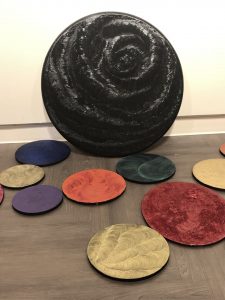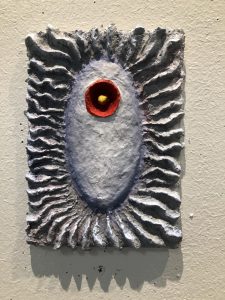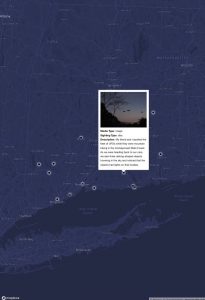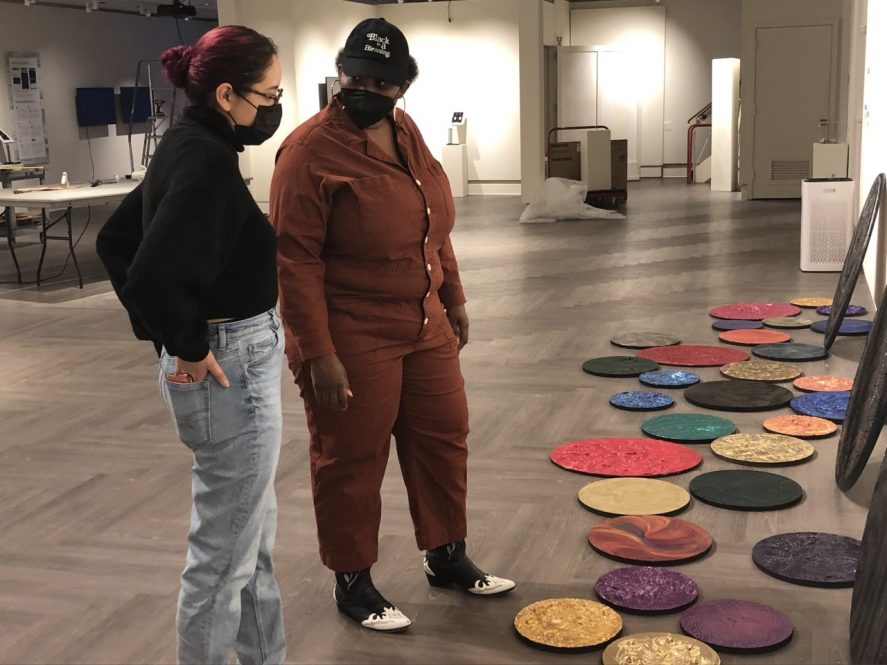When Ashante Kindle ’22 MFA was 10 years old she says she wanted to be either a teacher or fashion designer, maybe a dancer or singer.
One could argue though, her childhood spent in family-owned beauty salons and barbershops – where her aunt was a beautician and uncle a master barber, and where she has vivid memories of learning to braid hair from her cousin – set up Kindle for a career that focused on Black hair.

But instead of being the person with the scissors, she’s holding a paint brush – or a hairbrush or hair comb – to smear color on canvas, mimicking the waves and curls of a head of hair in acrylic as only an artist can.
“Hair is just a really heavy thing,” Kindle, who hails from Tennessee, says. “When you get your hair done it’s just a total mindset change. Think about how intimate that act is between a beautician and a client, even if they’re strangers there’s trust. Your back is to them, you’re lower than them, their hands are on one of the most precious parts of your body. I think about it as this exchange of energy and life source.”
Kaelynne Hernandez ’22 (SFA) has been equally as influenced by exchanges of energy and life source.
At 10 years old, the New Haven native says she wanted to be an astronomer, but as a shy child she turned to art to express herself, and today Hernandez has channeled an interest in the universe as a muse for her painted paper pulp sculptures.
“The imagery is stuff that anybody could understand,” she says of her work. “It can be the birth of planets or the birth of a star, or it could be something bodily. I feel like the imagery comes from an unconscious collective state of mind that we have in all of us. It’s recognizable because it’s ingrained in us as humans.”
Hairdresser and astronomer weren’t ever on the mind of Matthew Mullin ’22 MFA. He wanted to be a baseball player, like so many other 10-year-old boys whose childhood dream didn’t materialize.
But what binds together these three – and the dozens of other BFA and MFA graduates from the Art and Art History and Digital Media & Design departments – is two spring shows that put their best work on display at The William Benton Museum of Art and UConn’s Art Building in the Fine Arts Complex.

Oh – and Mullin’s final DMD project focuses on alien encounters, so he, too, looked to the universe for inspiration.
“It’s just been a fun way to kind of wrap up what I’m doing. When you’re in the slog of different semesters and just trying to get through it all, being able to switch to a fun alien UFO program helps you get through,” he says, turning serious. “There are two major questions of humanity: What happens when we die and are we alone, are we the only ones out here? Those are the two questions that have puzzled people for the history of humankind. It’s been interesting to play in that space.”
His thesis project, “Encounter,” is an app that maps reported alien sightings like real estate listings, in which users can click through to videos and photos and see different articles about various encounters. On display at the Benton, it features a believability ranking system and relies on user-submitted content.
The Massachusetts native acknowledges the concept is “a little bit out there and a little bit unconventional” but that’s what excited him, along with the chance to create interactive technology that could have other applications.
“Yes, the project is about UFOs and aliens, and if you’re not into that kind of thing that’s fine,” he says. “Look at the structure, the blueprint of the app. I have this heat-map visual that I’m using to show hot zones of UFOs. Take out the UFO part, apply that to public transportation and you can see heat-map visuals of where buses or subway systems may be having difficulties or breakdowns. The same is true for power grids.”
He adds, “The thing that I always liked about my project is the basic structure, the basic concept of it. It could be applied to so many different things. I just wanted to have fun with it as my final project, so I applied it to aliens and UFOs.”
It’s also what draws him to DMD; it can be applied to anything.
After getting his undergraduate degree, Mullin was interested in helping young low-income families, so he worked for the early education nonprofit Jumpstart. Then, he transitioned to a job at The Trustees of Reservations in Massachusetts when his interest shifted to land and wildlife conservation. Two years ago, his attention turned again and he was drawn to higher education, bringing him to UConn.
But his love of baseball never wavered, and he uses his UX/UI skills as a volunteer with the Hyannis Harbor Hawks, a collegiate summer team on Cape Cod that has benefitted from his graphic design prowess.
And now, as the father of a toddler, he’s headed to UPPAbaby, a Massachusetts-based manufacturer of car seats and strollers.
“One of the reasons they hired me was my experience in UX/UI,” he says of user experience and user interface design, or the way a computer program is presented or works. “They don’t really have much of that on their team right now, and before I came to UConn, I didn’t have much of that either. Without UConn and without DMD, I wouldn’t have this job. I wouldn’t have this opportunity.”
Kindle’s work, “Emerald City Sequence,” which also is on display at the Benton, draws its inspiration from the 1978 film “The Wiz,” a movie she says she watches or a score she listens to at least weekly.

“This is my take on the Emerald City sequence scene, where they go through the different colors,” she says of the 30-plus circular paintings hung randomly that comprise the 8-by-25.5-foot piece. “I work in abstraction, and I think about abstraction as these opportunities to recreate new realities for Black bodies to exist in. And ‘The Wiz’ was literally that, super Afro-futuristic, and the Emerald City sequence is luxury everywhere with furs, rubies, gold, fancy cars. Just seeing that as a child wasn’t an everyday occurrence for me. Within art and abstractions, I have the power to create those realities. That’s what I did with this piece.”
She says the individual pieces in the full work represent crowns of hair, with the bumps, twists, and texture of real-life hair, only depicted in jewel tones. Larger canvases painted in black were taken from her exhibit “A Dream Transformed” at the Jorgensen Gallery early this year.
At the start of the pandemic, Kindle says she cut her hair for the first time for artistic purposes, feeling like she was shedding what she describes as a direct witness to past trauma and experiences – a person’s hair.
“There are many artists who make work about hair because it’s such a part of our identity,” she says. “Even outside of Blackness there are a lot of people of different identities who make work about hair. Hair, a single strand is weightless, but think about that strand. It tells everything about your body from health to stress.”
After graduation, Kindle is making a go of full-time artist life with a June show lined up in Nashville and one in California in November. She’s applied for some residencies and is considering a move to New York City. Between shows and continued work, she says she might break for a teaching opportunity, something she loved while doing her graduate work.
“It’s just about finding what you love,” she says. “I don’t feel like I’m working. I don’t feel like I’ve worked in years. I just love what I do so much. It allows me into so many new places that I would have never been able to be in had I just continued to live in fear – like working with students and showing at different universities. Working with the students here, especially the undergrad students, I just love it. Art allows me to flow freely and do my part.”
Hernandez was the beneficiary of Kindle’s teaching and has 17 pieces in the BFA show at the Art Building.

She starts with shredded newspaper that’s ground into a pulp. Additives make it into a clay and then begins the sculpting on a wooden panel. Once dry, a finished piece looks like concrete – until Hernandez adds color.
She leans toward shades of blue, red, purple, and white, which to her evokes the colors of the universe, and favors one piece that looks like a cupped tulip in red with a single yellow stamen: “I got the inspiration from a painting by another artist. He named his piece ‘The Flaming One’ and mine reminds me of ‘The Chosen One.’ I guess that’s what I would name it because it’s one object being the center point and it’s like a becoming, a big transformation,” she says.
Post-graduation, Hernandez says she’s still considering her options and is looking at post-baccalaureate programs to give her more experience and let her test the possibility of grad school. One thing is certain, she wants to find a way to make art work for her.
“It’s not going to happen right away,” she says. “But I know it will happen.”
The “2022 Studio Art + Digital Media and Design Master of Fine Arts Thesis Exhibition” is open at The William Benton Museum of Art through May 8. It features graduate students from both departments.
The 2022 BFA Exhibition for art and art history undergraduates is open at the Art Building, 830 Bolton Road, Storrs, until April 28. A website dedicated to the exhibit will go online in early May.
“Resilience: 2022 UConn Digital Media & Design BFA Senior Exhibition,” featuring more than two dozen undergraduate DMD students, is open at the Jorgensen Gallery until April 29. It also is available online.



